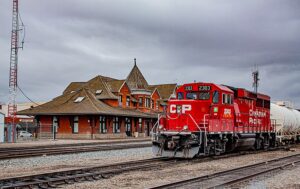President Donald Trump on Friday signed an executive order temporarily expanding the amount of beef the U.S. can import from Argentina, a move the White House says is aimed at…
Canadian Rail Stoppage Looms This Week
The Associated Press’ Tom Krisher reported this past weekend that “Canada’s two largest railroads are starting to shut down their shipping networks as a labor dispute with the Teamsters union threatens to cause lockouts or strikes that would disrupt cross-border trade with the U.S.”
“Both the Canadian Pacific Kansas City and Canadian National railroads, which haul millions of tons of freight across the border, have stopped taking certain shipments of hazardous materials and refrigerated products,” Krisher reported. “Both are threatening to lock out Teamsters Canada workers starting Thursday if deals are not reached.”
“On Tuesday, CPKC will stop all shipments that start in Canada and all shipments originating in the U.S. that are headed for Canada, the railroad said Saturday,” Krisher reported. “The Canadian Press reported that on Friday, Canadian National barred container imports from U.S. partner railroads.”

Stoppage Would Negatively Affect Canadian Ag Producers
The USDA’s Foreign Agricultural Service wrote in a report on Aug. 15 that “if there is rail work stoppage, agricultural producers in Canada, particularly of grains and oilseeds, would be heavily impacted, as over 90 percent of their products move by rail. In 2023, 25 percent of all value derived from Canada’s agricultural and related product exports to the United States were by rail, averaging over $40 million USD per day.”
“During the first half of 2024 (January – June), Canada similarly exported a daily average of over $38 million USD in agricultural and related products by rail, ahead of their even higher-shipping harvest period (September – October),” the USDA FAS said. “While Canada has suffered rail interruptions in the past, this is the first time the country has faced closure of both major rail companies at the same time. The economic repercussions of rail work stoppage of this magnitude would be devastating locally, and given the interconnectivity, consequently impact the movement of goods in United States and beyond.”
Rail Networks Outside of Canada Would Remain Operational
Reuters’ Promit Mukherjee reported that “both CN and CPKC have said their networks outside of Canada will continue to operate but the stoppages could have ripple effects. The two Canadian rail operators’ networks connect with several key U.S. rail and shipping hubs such as Chicago, New Orleans, Minneapolis and Memphis. CPKC’s network also extends further south connecting with ports on both the east and west coasts of Mexico.”
But Gregory D. DeYong, a Southern Illinois University Carbondale associate professor of operations management, said that “‘a Canadian rail strike wouldn’t occur in isolation. The U.S. and Canadian systems are quite interconnected. In particular, the Canadian Pacific Kansas City Limited system operates extensively in Canada, the U.S. and Mexico.”
“Although U.S. rail and truck carriers, as well as Canadian truck carriers, can likely pick up most of the freight that would be affected by a Canadian rail strike, this will lead to much tighter shipping capacity, potential delays and higher shipping costs.”
What Are the Labor Disputes About?
Mukherjee reported that the potential shut down of shipping networks “marks the first time that the country has faced a simultaneous labor stoppage at the railroad firms as they normally negotiate their labor agreements in alternate years.”
“The Teamsters union argues CN wants to implement a forced relocation provision which would see workers ordered to move across Canada for months at a time to fill labor shortages,” Mukherjee reported. “CN says it has made four offers this year on wages, rest, and labor availability while remaining fully compliant with government-mandated rules overseeing duty and rest periods.”
“The dispute with CPKC centers on safety issues with the union arguing the firm wants ‘to gut the collective agreement of all safety-critical fatigue provisions’, meaning crews will be forced to stay awake longer, boosting the risk of accidents,” Mukherjee reported. “CPKC says its offer maintains the status quo for all work rules, ‘fully complies with new regulatory requirements for rest and does not in any way compromise safety.'”





